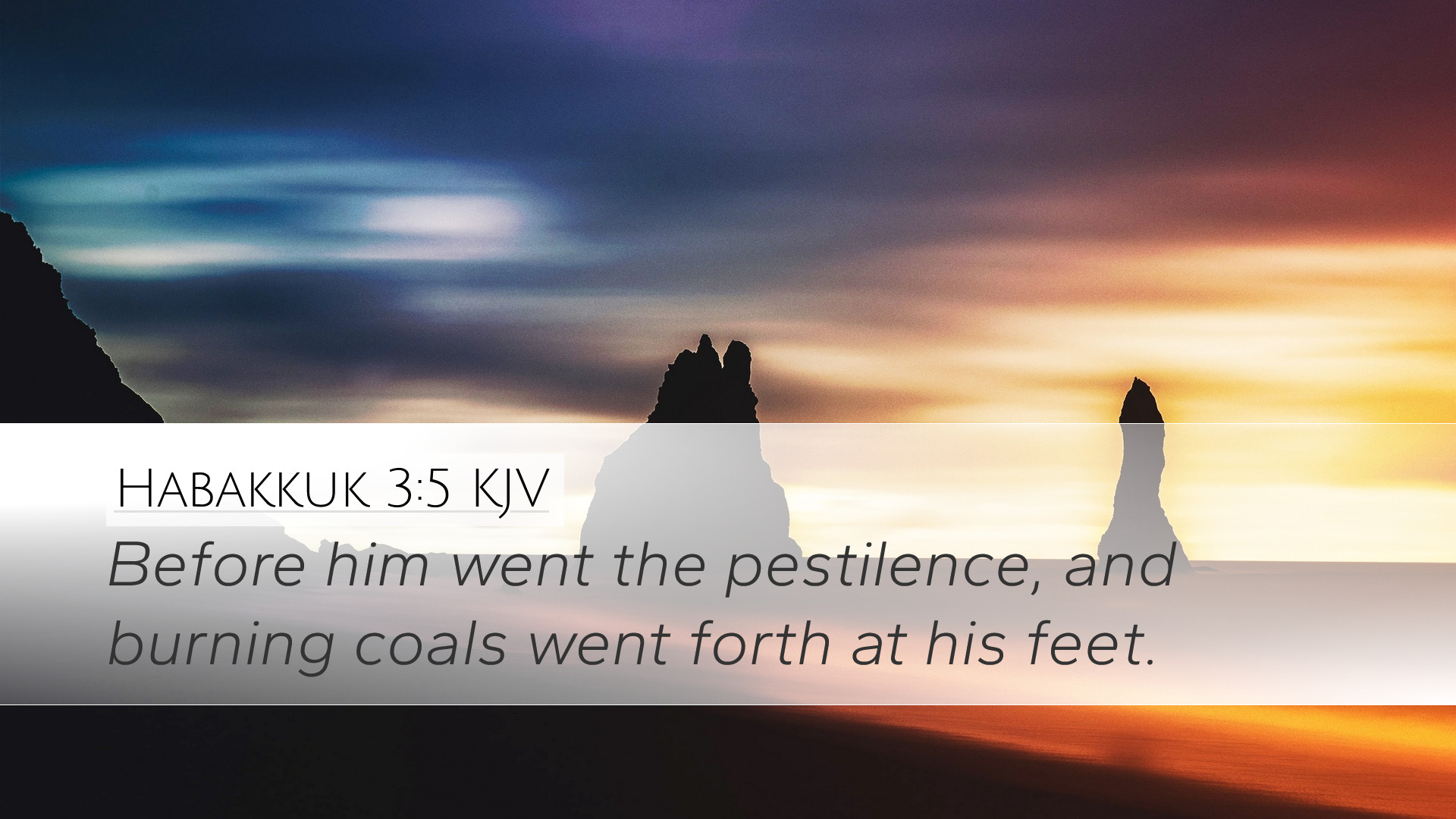Old Testament
Genesis Exodus Leviticus Numbers Deuteronomy Joshua Judges Ruth 1 Samuel 2 Samuel 1 Kings 2 Kings 1 Chronicles 2 Chronicles Ezra Nehemiah Esther Job Psalms Proverbs Ecclesiastes Song of Solomon Isaiah Jeremiah Lamentations Ezekiel Daniel Hosea Joel Amos Obadiah Jonah Micah Nahum Habakkuk Zephaniah Haggai Zechariah MalachiHabakkuk 3:5
Habakkuk 3:5 KJV
Before him went the pestilence, and burning coals went forth at his feet.
Habakkuk 3:5 Bible Commentary
Commentary on Habakkuk 3:5
Habakkuk 3:5 states:
"Before Him went the pestilence, and burning coals went forth at His feet."
Introduction
This verse encapsulates a dramatic portrayal of God's powerful presence and the terrifying impacts of His divine judgment. The imagery of pestilence and burning coals signifies both the destructive nature of God’s wrath and the purifying effect of His holiness. This commentary seeks to elucidate the meaning of this verse by drawing insights from several public domain commentaries.
Contextual Background
The book of Habakkuk is a profound conversation between the prophet and God concerning the issue of Judah's sin and the rise of the Babylonian empire. Habakkuk’s three chapters culminate in a fervent prayer, attesting to God's sovereignty and might. This particular verse reflects the culmination of the prophet’s vision of God's majestic and fearsome nature, especially against the backdrop of impending judgment upon His people.
Exegesis of Habakkuk 3:5
The phrase "Before Him went the pestilence" suggests that the very presence of the Lord is linked with calamities that follow as a form of judgment or divine recalibration. The pestilence can be interpreted as a symbol of God’s anger and the consequences of sin, resonating with the Egyptian plagues and similar biblical accounts.
Insights from Commentaries
-
Matthew Henry:
Matthew Henry notes that "pestilence" and "burning coals" serve to illustrate the vengeance inflicted by God upon the adversaries of His people. They represent God's instruments that He uses to execute His judgments. Henry emphasizes that these images remind believers of the seriousness of divine discipline.
-
Albert Barnes:
Albert Barnes provides the insight that the passage demonstrates God’s power over creation, indicating that calamities in the world align with His divine will. He affirms that the "burning coals" symbolize the fervent intensity of God's anger, suggesting both purification and destruction. This serves as a reminder of God’s holiness and the seriousness of His word in both comforting and alarming ways.
-
Adam Clarke:
Adam Clarke expresses that "pestilence" may refer to diseases or moral decay that are precursors to God's judgment. He also points out that the "burning coals" symbolize the fervent heat of divine judgment that sweeps through the earth. Clarke emphasizes that these phenomena are demonstrations of God's power and holiness, meant to turn the hearts of men back to Him.
Theological Reflections
In evaluating this verse, one can reflect on the dual theme of God’s judgment and salvation. The imagery conveys God’s authority over life and death, and the subsequent call to repentance for those under His judgment. It urges the faithful to consider their own actions and attitudes in light of God’s consuming fire.
This verse also speaks to the balance between God's justice and mercy. While God’s nature includes wrath against sin, it equally highlights His desire for repentance and restoration. The prophet’s role as an intercessor becomes incredibly significant in emphasizing the need for a righteous response from God’s people.
Practical Applications
-
Awareness of God’s Sovereignty:
Recognizing that God's presence brings both comfort and terror should stir a sense of awe and reverence in the hearts of believers. Daily living should reflect the understanding that God's will prevails over earthly affairs.
-
Call to Repentance:
This verse should motivate Christians to continually examine their lives in light of God's holiness, embracing a posture of humility and repentance.
-
Understanding Divine Judgment:
Understanding the concepts of pestilence and burning coals can help congregations deal with the realities of suffering and loss while affirming God's overall purpose in judgment to bring about restoration and holiness.
Conclusion
Habakkuk 3:5 is a stark reminder of the omnipotent nature of God and His sovereign control over all things. Through the blend of judgment and mercy, believers are invited to witness the grand narrative of redemption. In unpacking this verse, we are reminded to cultivate our relationship with God, approaching Him with a heart of repentance and awe.


